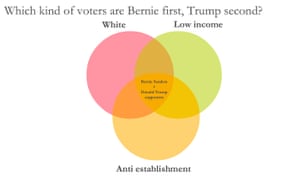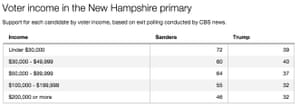In this most bizarre of presidential election cycles, every day seems to bring another jaw-dropping development. Donald Trump on the size of his genitals,Ben Carson and the Egyptian pyramids, Bernie Sanders’ socialist revolution,Hillary Clinton and the cloth she used to wipe her private email server clean.
But it’s not just the candidates who have raised eyebrows in 2016.
The latest startling phenomenon is the voter who is feeling the Bern, but also has eyes for the Donald.
This week the Guardian sought out Sanders fans who are contemplating switching their allegiance to Trump if Hillary Clinton secures the Democratic nomination.
Almost 700 people replied to the call-out, and some 500 of them said they were thinking the unthinkable: a Sanders-Trump switch.
They explained their unconventional position by expressing a variety of passionately held views on their shared commitment for protecting workers and against new wars, on their zeal for an alternative to the establishment, and on their desire to support anyone but Hillary Clinton.
As one respondent, a 34-year-old male IT technician, put it: “Bernie and Trump agree a lot on healthcare, Iraq war, campaign finance and trade. I really want to move on to something new, new ideas from outside the box. Maybe Donald Trump can provide that.”
The Guardian call-out was not a poll, but controlled surveys by polling companies have identified this small but not insignificant slice of the Sanders crowd who would consider backing Trump.
In an NBC News/Wall Street Journal survey conducted by Hart Research Associates this month, 7% of Sanders voters said they could see themselves supporting Trump. Some 66% said the same for Clinton.
A similar proportion of Sanders folk – 8% – gave Trump a positive likeability rating, compared with 48% for Clinton. That figure is unlikely to be causing Clinton campaign aides much loss of sleep.
“The data does not indicate any meaningful concern for Clinton that if she wins the Democratic nomination large numbers of Sanders voters would head to Trump,” said Jeff Horwitt, a senior vice-president with Hart Research.
So we are not seeing the birth of a new cross-party force in American politics. But we are seeing an interesting political dynamic. Almost one in 10 Sanders supporters apparently think Trump is next best thing to their candidate, and certainly better than Clinton.
A woman, 55, who described herself as a homemaker, said: “Both Trump and Sanders are non-establishment candidates who are not bought by the special interests that have control over policy and legislation because of their ‘bribes’.”
One male Sanders fan wrote: “Trump is an obnoxious vulgar blowhard who says foolish things. However, unlike Clinton – but like Sanders – at least he is an outsider who understands that the government and the economy are broken.”

Shared motivations
Responses to the Guardian call-out show that Trump and Sanders share a few themes in their messaging that resonate with the same groups. When asked which was the most important issue in determining candidate choice, respondents in a CNN/ORC poll overwhelmingly checked the box that said “the economy”.
Messaging from Sanders and Trump on this issue varies greatly – Trump focuses on jobs moving overseas while “socialist” Sanders uses the 1% as the framework for talking about economic inequality.
But both candidates appear to have been effective in convincing voters that they ‘“get it”. Another CNN/ORC poll released at the end of February found that 46% of Republicans said Trump, better than any other candidate, understands the problems facing them personally. And 48% of Democrats said the same about Sanders.
Many respondents to the Guardian’s call-out also expressed the sentiment that Sanders and Trump get voters’ economic pain. Several said they found an affinity between the two candidates’ take on the economy, particularly trade.
A male medical emergency technician, 36, from Chicago, said he had watched the devastation wrought on areas of the city by job losses that in his view had been caused by free trade. “Donald Trump is the only candidate besides Bernie Sanderswho cares about curtailing Free Trade. This is my only reason for supporting him if he makes if to November and Clinton is the Democratic nominee.”
The other primary motivation for Sanders fans thinking about backing Trump is widespread negative feelings towards Hillary Clinton.
Of the respondents who shared their views, 61% said they were motivated by an anti-Hillary feeling – the remainder were split down the middle between saying they were “pro-Trump” or felt equally pro-Trump and anti-Hillary.
Commonly expressed criticisms of Clinton were that she is a war-monger, that she is corrupt and “owned by Wall Street”, that her policies are Republican in all but name and that she is an establishment insider while Sanders and Trump are both outsiders. Views such as this are also driving some Sanders followers to vow that for them it is “Bernie or bust” – should he fail to win the nomination they will abstain entirely from the ballot.
A 29-year-old female data processor wrote: “As horrific as Donald Trump is, and he is a horrible, racist, misogynist idiot, I don’t think Hillary Clinton is any better. I feel like with Trump, he could at least inspire a revolution, even if it is against him. I prefer chaos to stagnation.”
Such deep suspicions of Clinton are also reflected in formal opinion polls such as a Hart Research survey for NBC/WSJ that found that a third of Sanders voters saw her in a negative light. “That’s a figure that needs to be addressed – the Clinton campaign is concerned about it and are focused on doing something about it,” Horwitt said.
The demographics
A look at the demography of Trump and Sanders supporters also provides some insights. If you were to get Sanders’ supporters in a room with Trump’s supporters, the two groups would be pretty hard to tell apart.
Repeated polling (including exit polls of individuals who have actually voted in primary elections so far) shows that Sanders’ supporters are overwhelmingly white, and that black voters are unlikely to vote for Sanders.
Both of those facts are also applicable to Donald Trump. A February CNN and ORCpoll found that 44% of all white respondents said they had a favorable opinion of Trump, while 52% of white respondents said the same about Sanders. Non-white respondents were less likely to choose either candidate over others from their party.
Income is another shared characteristic. Exit polls from New Hampshire where Sanders defeated Hillary Clinton showed that the biggest fissure between voters was income. Among voters with a family income of less than $30,000, Sanders defeated Hillary by 48 percentage points but when the income was above $200,000, Sanders lost by seven percentage points. The Republican primary exit polls in New Hampshire revealed the same trend for Trump; his support was seven percentage points higher among low-income families than those earning $200,000 or more.
The responses to our callout also came from lower income groups – 25% of respondents said that they earned less than $35,000 per year.
But the demographics of Trump and Sanders supporters also differ in several significant ways. Respondents in the CNN/ORC poll were more likely to have a favorable opinion of Trump if they were older (44% of those age 65 and over supported the candidate compared to 25% of those age 18-34) but younger respondents were more likely to support Sanders (51% of those age 65 and over compared to 69% of those age 18-34). While Sanders supporters were likely to say that they lived in urban areas, Trump’s supporters were more likely to say that they lived in rural parts of the country.
There was also another impassioned category of Sanders fans in the Guardian’s call-out: 214 people – 32% of all respondents – replied to express that they would never vote for Trump. Some expressed anger at the Guardian for even asking the question, which they saw as an insult to the Sanders movement and an example of “mainstream media” bias.
Amber Jamieson contributed reporting
Tell us Which election issue matters most to you?
As the race to the White House heats up, we’d like to know which issue – big or small – you want the candidates to discuss more. Your contribution will help shape our election coverage.
*I had to post the entire article.
Shape our coverage*I had to post the entire article.










